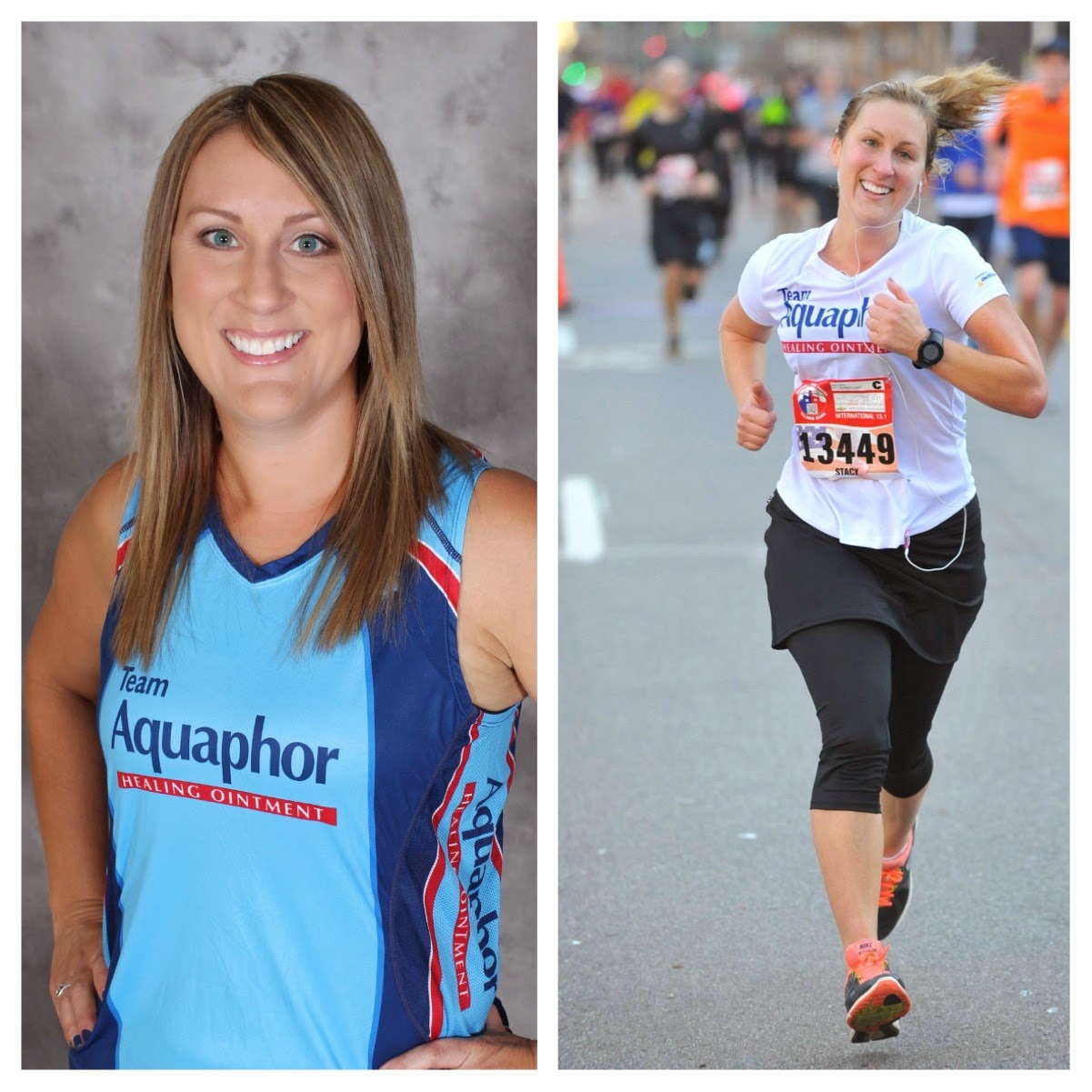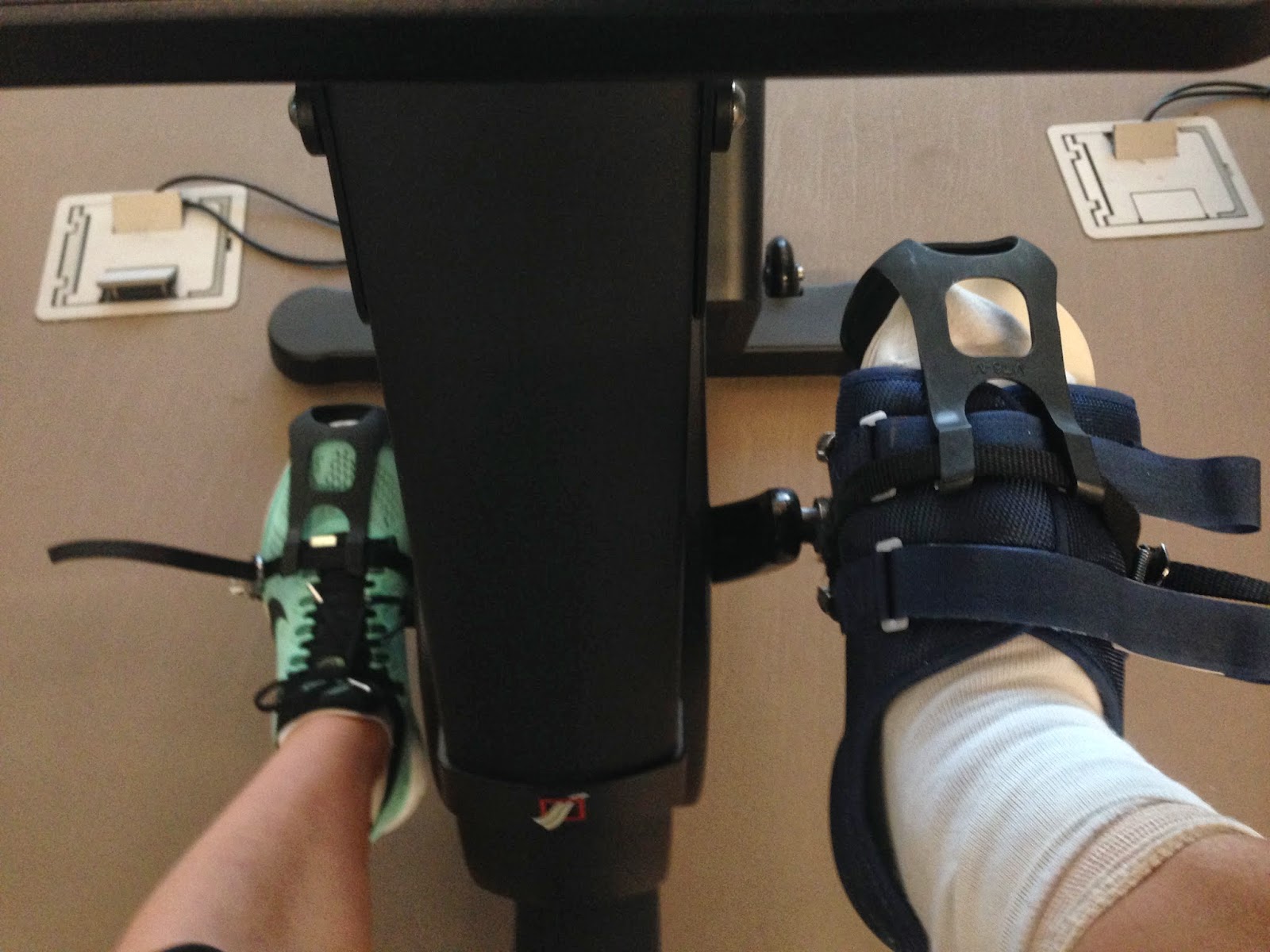
Good morning dear readers. I've been chatting with and following Stacy's blog for a while and I love her upbeat attitude and voice of authority. I've been super fortunate in my running career - I've had aches and pains and a few injuries, but nothing that left me sidelined for any significant time. Stacy recently underwent surgery and shared her thoughts on the process here. If you hop over to her site today, you can read my post on snacking for success.
As runners (and athletes), most of us are at least somewhat competitive. Even if you aren’t competing for an actual award, you are most likely competing (even if it is unspoken) with your friends, your facebook friends, colleagues or just that other runner twenty yards ahead of you on the path. I have noticed this “competition” also carries over to injuries. It becomes a “game” of “so-and-so ran that marathon with her sprained ankle, so certainly I can put in my ten mile training run with this pain in my knee.” As ridiculous as this seems written in black and white, I think many of us can admit to doing this. Problem is, this is definitely not “healthy competition.”
I had avoided any major injuries for over four years as a runner. In fact, I don’t think I ever missed more than two weeks due to an injury. As a runner, probably some of the worst possible words you can hear the doctor say are “no running.” The first week of December I learned that I could not run another step until I had surgery. The bone spurs were essentially causing the stress fracture that even if it healed, would just return without surgery. The doctor suggested surgery as soon as possible (knowing that I wanted to limit my time “off”). In hindsight, the surgery itself may have been the easy part. This whole ordeal made the mental grind of a marathon seem like child’s play. My goal in this post is to share my “coping” experience. I know we all hope to run injury free, but if the injury bug hits you I hope some of these tips may help you cope.

My first word of advice is to find a doctor that “gets” you. Find a doctor that is active themselves, works with other athletes, and in general understands that you are an athlete and want to be on the sideline as short of a time as possible. I often hear stories of doctors telling patients “no activity,” but in my opinion there is almost always something you can do if your doctor understands that complete rest is not something you aspire too. My doctor allowed me to get back to the gym four days post-surgery. Was I doing what I wanted to do? Absolutely not. I was in a boot and limited to the rower, recumbent bike and upper body weight machines. But even this small, limited amount of activity helped keep me sane, and my doctor understood that need. He also helped me to know exactly what exercises would help get me back to running more quickly.
The same goes in choosing a physical therapist, if necessary. I found mine from a referral from a very active friend. Like my doctor, she knew that my goal first and foremost was to run and worked hard to get me there. She even allowed me to run about two weeks before I was “supposed” to on an Alter-G treadmill (You can read about my Alter-G experience here: http://fitfemmes.net/2014/02/11/alterg/).
The second part of coping with recovery was dealing with my head. While I have put in countless hours of physical work rehabbing my foot physically, I have had to deal with the mental aspects 24/7. Patience is not my strong point. Eight weeks felt like forever at times! A few things I learned during these eight weeks:
- Do not (I repeat, do NOT!!) compare yourself to pre-injury/surgery. I will compare again someday at a date to be determined, but do not do it immediately! My early run paces were very depressing. A few weeks later, while not where I was pre-surgery, they are getting much closer. It will happen but it takes time. As soon as I start to compare, I get very depressed. If I look at it as a “post surgery PR” it significantly helps my attitude!
- Find a support network. There were days when I was discouraged and might have lacked motivation to get to the gym (Let’s face it, I didn’t look forward to rowing!) if I didn’t have friends holding me accountable.
- Try to find something else you enjoy that you can apply yourself to. I did not find a cardio workout that gave me a “runner’s high,” though my sister-in-law said spin class did that for her while she was injured. I chose to divert my attention to strength training and feel like in certain moves I have actually gotten stronger post surgery (For example, I just set a deadlift PR last week). I have lost endurance and some coordination/agility, but I know those will return in time.

Finally, and most importantly, I have learned to listen to my body. We all say that is important (and know it deep down), but how many of us actually follow this? If something hurts, do not ignore it! Rest it, and if it doesn’t improve get it checked out. Ignoring it is not going to make the problem non-existent! I used to take very few days off and push through just about anything. I definitely don’t want to become “soft” at the gym and feel like I am still pushing myself hard, but I am learning to be able to say “Ok, that hurts, not doing it today…” I am also okay with rest days. I used to hate rest days, but now I not only see their importance, I occasionally even take two in a week. This is huge for me!
I truly hope you are one of the “lucky ones” who never has to face a major injury. But if/when that nagging pain hits, I hope you will be able to take something from my experience. Oftentimes if we take a few of these steps (rest, getting something checked out, etc), it doesn’t even have to get to the point of as long of a break as I was forced to take.
Here’s to a healthy 2014 running season!

1 comment:
Great post! I also have only had minor injuries that only required 1-2 weeks off. Sounds like you did a great time with staying active while resting from running!
Post a Comment